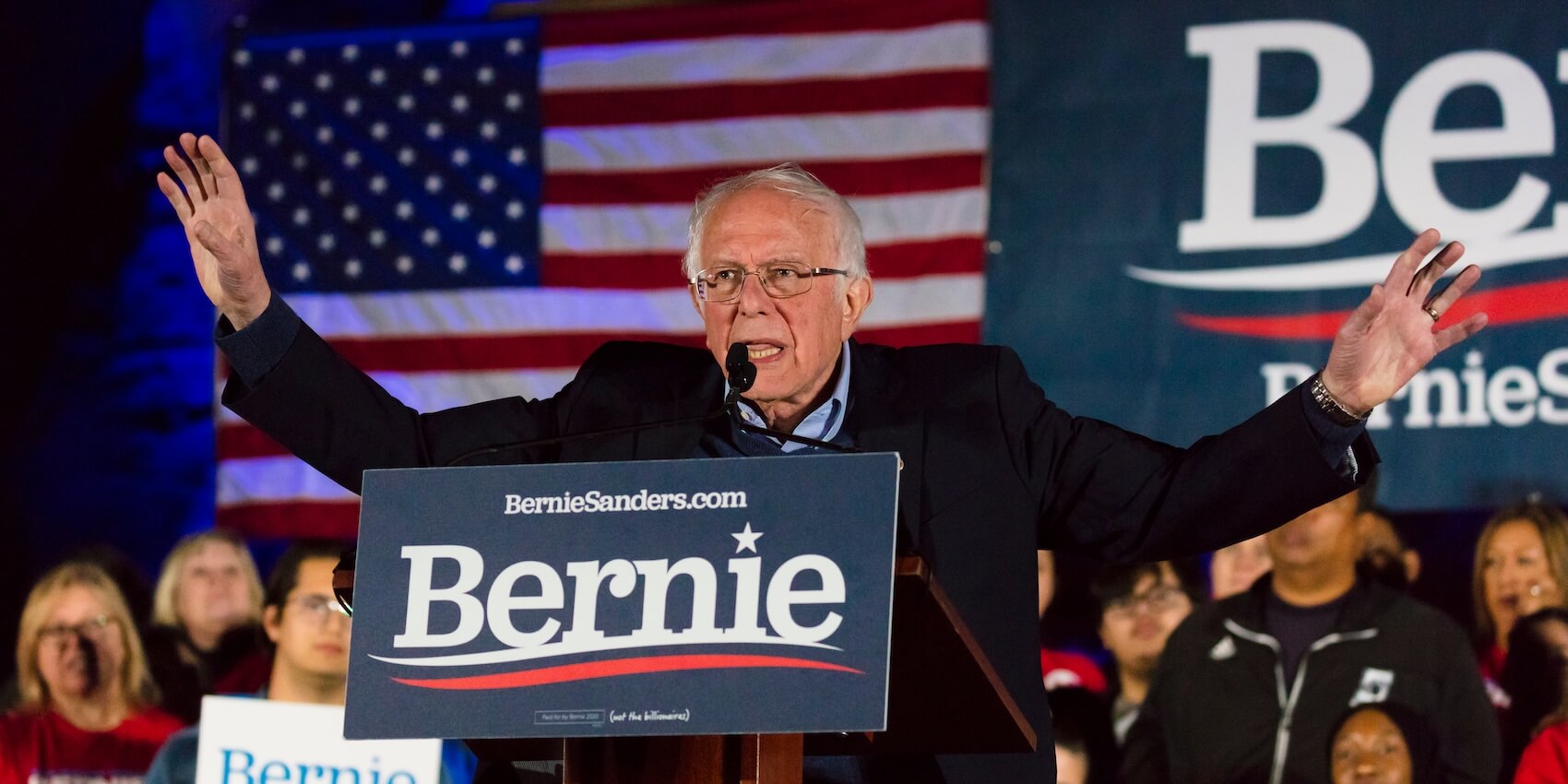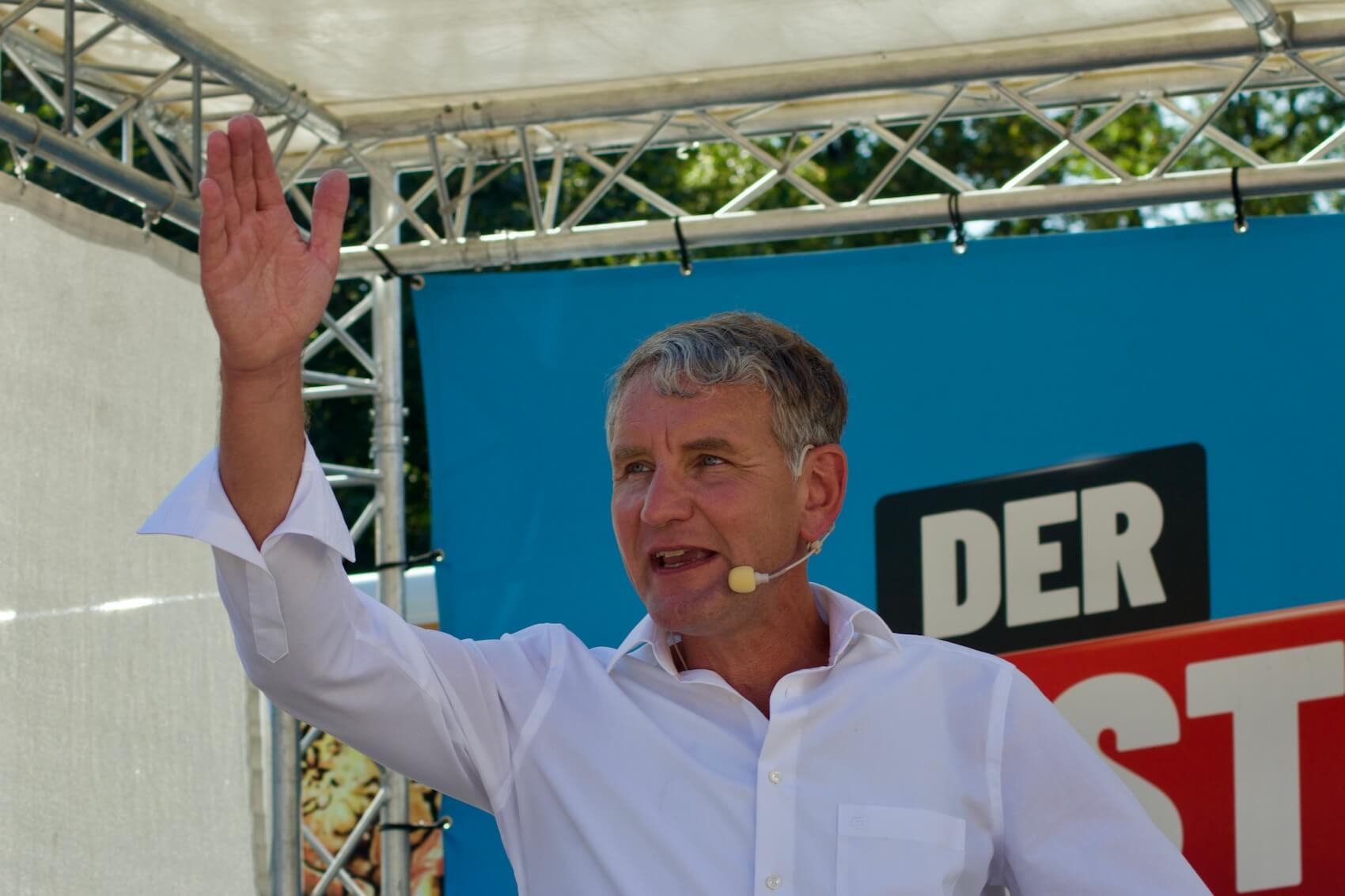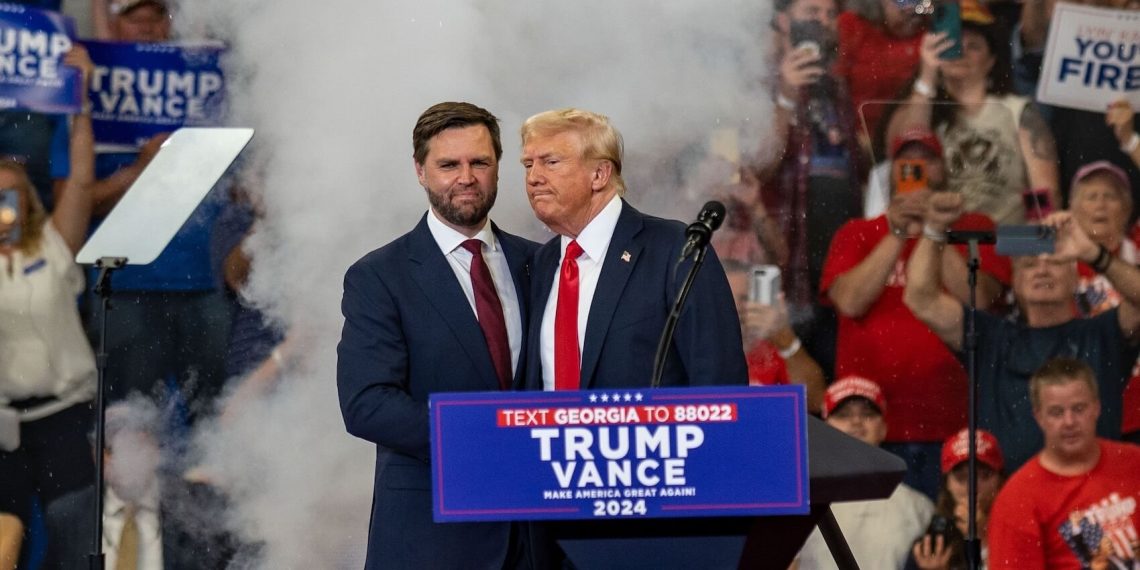In an ECPS interview, Dr. Thorsten Wojczewski of Coventry University argues Trump uses foreign policy as a tool to externalize US problems, reframing issues like poverty and unemployment as outcomes of foreign influence. Trump’s “American people vs. Washington establishment” narrative, Wojczewski says, fuels populist-nationalist sentiment by attributing domestic challenges to global elites and immigration, aligning with longstanding US nativist narratives. Wojczewski compares this approach to other populist strategies, contrasting it with left-populists like Bernie Sanders, who emphasize multilateralism and solidarity.
Interview by Selcuk Gultasli
In an insightful interview with the European Center for Populism Studies (ECPS), Dr. Thorsten Wojczewski, Lecturer in International Relations at Coventry University, examines how Donald Trump’s foreign policy discourse reframes domestic issues as external threats, solidifying a populist-nationalist coalition. According to Dr. Wojczewski, Trump went beyond the typical “Republicans versus Democrats” divide, framing the political landscape as “the American people versus the Washington establishment.” This re-framing allowed Trump to attribute societal issues, such as “poverty, unemployment, decaying infrastructure, and crime,” to foreign policy decisions driven by “the ‘globalist’ establishment, immigrants, and foreign nations.” Wojczewski notes that “foreign policy became a projection screen for societal problems” in Trump’s rhetoric, attributing America’s domestic challenges to flawed foreign influences.
Dr. Wojczewski also explains that this tactic of externalizing US issues resonates with longstanding nativist narratives, as Trump portrayed foreigners and the “globalist” establishment as key threats to American interests. Trump’s rhetoric, which framed the elites as an existential threat, blended populist anti-establishment sentiments with nationalist elements that particularly appealed to white Americans. “This approach draws on longstanding nativist themes in US history,” Wojczewski remarks, adding that Trump’s discourse taps into the deeply ingrained idea of America as a civic community threatened by outsiders.
Wojczewski further contextualizes this strategy within a broader populist landscape, referencing other populist actors like Germany’s Alternative for Germany (AfD) and France’s Rassemblement National (RN), who similarly emphasize national identity and seek to project foreign influences as detrimental to national well-being. While AfD plays with Euroscepticism, often highlighting Germany as the “stupid paymaster” within the EU, RN frames the EU as a German-dominated project that harms French interests, showing how national narratives shape distinct yet similar populist approaches.
In contrast, left-populists like Spain’s Podemos and Bernie Sanders in the United States offer a more inclusive notion of “the people.” As Wojczewski points out, “Sanders and Podemos criticize the establishment for securitizing migration,” presenting the people as an open, pluralistic group rather than focusing on an ethnocultural identity. This is reflected in Sanders’ appeals to America’s legacy as a “nation of immigrants,” emphasizing solidarity over isolation. Unlike the extreme nationalism seen in Trump or RN, Podemos and Sanders criticize liberal internationalism as masking a militaristic agenda. Sanders, for example, advocates multilateralism, as “issues like climate change and economic inequality require multilateral action and solidarity,” explains Wojczewski, showing a left-wing populist commitment to international cooperation rather than exclusion.
Through these comparisons, Dr. Wojczewski illustrates the diversity in populist foreign policy, noting that populism can vary widely depending on its ideological combination, from extreme nationalism to global solidarity. Trump’s approach, however, clearly leverages external threats to build a populist-nationalist base, setting a precedent that aligns with right-wing populist movements worldwide.

Here is the transcription of the interview with Dr. Thorsten Wojczewski with some edits.
Populism and International Relations: A Highly Dynamic Research Field
Professor Wojczewski, thank you very much for joining our interview series. Let me start right away with the first question. How do you assess the evolution of populist theory in the field of international relations? What is the impact of far-right ideology on foreign policy beliefs and preferences?
Dr. Thorsten Wojczewski: Populism and international relations has become a highly dynamic research field. If we look back about 10 years, there was minimal research on this topic, but in the last 5 or 6 years, numerous studies, books, and edited volumes have emerged, leading to substantial progress in a relatively short period. We now see increasing theoretical pluralism, with different approaches to conceptualizing populism—as an ideology, a style, political logic, or strategy. Research agendas are also varied, ranging from conventional analyses of populism’s impact on foreign policy preferences to examining how populism influences foreign policy-making style, foreign policy as a space for political mobilization, and populist identity construction. Additionally, factors like international relations, global governance, and regional governance have played roles in populism’s rise, resulting in a diverse and multifaceted research agenda.
That said, there are certain limitations. One major limitation, especially in the field of international relations, is that populism is still largely viewed as inherently negative and dangerous. To some extent, this perception is understandable, as populism can indeed pose risks and challenges to liberal democracy—especially when it comes to the populist radical right, which can be quite destructive, as seen in cases like Donald Trump. However, there are also forms of populism that pose no threat to liberal democracy and, in many ways, can even strengthen it. This perception reflects an “establishment bias” in populism research, where populists are seen as the problem and the establishment as the solution. This binary is problematic, as populism can also serve as a positive force. For example, left-wing populists like Podemos or Bernie Sanders offer a very different political vision compared to the populist radical right. Thus, populism should be approached as a more nuanced phenomenon, rather than being seen as purely negative and dangerous.
Another challenge is distinguishing populism from related phenomena such as authoritarianism, nationalism, and the radical right. Often, the boundaries are unclear—where does populism end, and where do these other ideologies or discourses begin? For instance, how can we differentiate between populism and radical right politics?
Regarding the second part of your question on the impact of far-right ideology on foreign policy beliefs and preferences, this is the focus of my most recent paper. I argue that, as Cas Mudde’s terminology suggests, we should concentrate more on the “thick” or host ideology than on populism’s “thin” ideology. To truly understand the populist radical right, we should focus less on populism itself and more on radical or far-right ideology, which has a far more substantial influence on foreign policy preferences and beliefs.
In far-right ideology, a core belief is a strict adherence to a natural order of inequalities, which significantly shapes its foreign policy outlook. A central component is ultranationalism—a form of nationalism that defines the nation primarily in ethnocultural or racial terms and perceives various groups as being inherently in conflict. This worldview is deeply antagonistic, promoting an "us vs. them" mentality where one ethno-culturally or racially defined nation stands in opposition to others. Such a perspective fosters negative attitudes toward regional and global governance institutions and rejects universal norms, as the primacy of national identity, defined in ethno-cultural or racial terms, logically leads to a dismissal of international or universal principles.
Another related aspect is a chauvinistic foreign policy outlook—a relentless pursuit of a nation’s interests, often encapsulated in slogans like "America First," which prioritize national interests over the rights, concerns, and interests of others. While there are other elements of far-right ideology that influence foreign policy, I believe ultranationalism is the most crucial. Research in populism and international relations would greatly benefit from a deeper examination of far-right nationalism, as I argue that it plays a far more significant role in shaping foreign policy preferences than populism itself.
Populist Securitization Undermines Democratic Institutions and Fosters Authoritarian Tendencies

How do you see the interplay between securitization and populism shaping the legitimacy of democratic institutions, especially when populist leaders present the establishment as a security threat? Could you elaborate on the role of moral and existential threats in populist securitization strategies, and how these might differ when targeting domestic versus foreign "elites"?
Dr. Thorsten Wojczewski: I think populist securitization—essentially framing elites or the establishment as a security threat—can certainly undermine democratic institutions and foster authoritarian tendencies and policies. Donald Trump is a prominent example using this populist securitization strategy frequently, especially during his 2015–2016 campaign, by presenting the elites and establishment as a security threat.
However, populist securitization is not always harmful. For instance, if we contrast Trump with Bernie Sanders; Sanders also challenged the political establishment or elites. Still, his focus was on the destructive and undemocratic influence of big donors and the billionaire class. He highlighted how large corporations undermine democracy’s core principle of political equality through substantial influence over US politics via campaign donations. This also represents a populist securitization strategy but in a very different way.
We can say that populist securitization is an effective strategy for populist leaders or parties, as it legitimizes them while delegitimizing the establishment. By portraying elites as an existential threat, the populist leader can claim, “I am standing up for you; I am defending democracy and your interests against an elite that no longer represents you.”
Chauvinistic Nationalism in Populist Radical-Right Parties Limits Compromise and Cooperation
How do you assess the interplay between populism and nationalism shaping future cooperation among populist radical-right movements across borders, especially considering their inherently nationalist foundations? Could you elaborate on challenges populist radical-right actors face in building sustained transnational coalitions, given their nationalistic and often anti-globalist stances?
Dr. Thorsten Wojczewski: I think, to some extent, populism can assist the radical right in terms of international cooperation and transnational networking by providing a common enemy. This enemy may take the form of bureaucrats or so-called globalist elites, which helps the radical right mitigate national differences and antagonisms. Particularly in the United States and Europe, the radical right frequently uses the globalist conspiracy theory, suggesting that a globalist elite is disenfranchising ordinary people—an aloof elite disconnected from the common populace. This conspiracy theory is not new; it has existed in far-right discourse for decades and carries a clear anti-Semitic undertone, with “globalists” often serving as a code for Jews. This shared adversary becomes a rallying point that the radical right leverages to build international cooperation. In essence, having a common enemy is essential, and populism, combined with radical-right nationalism, offers this shared target, whether it be globalist elites or Eurocrats.
However, nationalism certainly complicates international cooperation for the radical right. While they may find common ground in shared opposition, significant differences emerge when it comes to proposing comprehensive alternatives, crafting policies, and making concrete policy proposals. This lack of unity is underscored by the fact that there are currently three radical-right factions in the EU Parliament. I would argue that the issue is less about ideology—there are more ideological similarities than differences among Europe’s radical-right groups—and more about national context and political style. Some radical-right parties, such as Italy’s Brothers of Italy (FdI)or France’s Rassemblement National (RN), aim to appear more moderate to attract conservative voters, toning down some of their more radical rhetoric. Meanwhile, Germany’s Alternative for Germany (AfD) is less focused on moderation, which makes other parties hesitant to associate with them, despite few substantive ideological differences.
One challenge, then, is the national differences and the varied political strategies and styles among these movements. Another obstacle is the inherent chauvinistic nationalism within these parties. When parties adopt slogans like “Germany First” or “France First,” they limit their ability to compromise and cooperate, as this mindset prioritizes national interests above all else. This is evident in the contrasting narratives about the EU promoted by Rassemblement National (RN) and Alternative for Germany (AfD). RN depicts the EU as a German-dominated project with Germany as the hegemon, while AfD claims Germany is the “stupid paymaster” subsidizing other EU countries. This clash of narratives creates further barriers to cooperation, as each party mobilizes distinct political strategies based on differing national narratives.
Conflicting Affective Narratives as Powerful Tools in Populist Radical-Right Rhetoric
What is the impact of affective narratives—such as fear, nostalgia, and moral superiority—within populist foreign policy discourses, and how these emotions shape international relations dynamics?
Dr. Thorsten Wojczewski: These affective narratives are absolutely crucial in populist radical-right discourses. Whether we look at figures like Donald Trump, Alternative for Germany (AfD), or others, they all, in some way, evoke fear, anxiety, and resentment. Their messaging often revolves around a perceived loss of control: “We’re being overrun by foreigners,” or as Trump famously put it, “Either we win this election, or we lose our country.” Mobilizing such existential fears is essential to their strategy.
However—and this is the interesting aspect—in addition to invoking negative emotions like fear and anxiety, populist radical-right discourses also promise a better future. While mobilizing existential fears, they simultaneously offer hope: if they gain power, they’ll “restore sovereignty” or “make America great again.” This evokes positive emotions, such as hope and nostalgia for the “good old days,” with promises to reverse multiculturalism, globalization, and restore order, identity, and sovereignty. These conflicting affective narratives—fear and hope, nostalgia and moral superiority—are powerful tools in populist radical-right rhetoric. I would argue that this blend of conflicting emotions and narratives partially explains their broad appeal and success.
AfD’s Populist Radical-Right Stance Is Less Eurosceptic than Germany’s Neo-Nazi NPD

How does the foreign policy approach of far-right parties like AfD and NPD reflect broader trends in global far-right movements, particularly regarding their stance on supranational institutions like the EU? What factors contribute to the differences in foreign policy outlooks between populist radical-right parties and extreme-right parties, and how do these distinctions impact their real-world diplomatic strategies?
Professor Thorsten Wojczewski: Alternative for Germany (AfD), as a populist radical-right party, is somewhat less dogmatic and less Eurosceptic than the extreme-right National Democratic Party (NPD), a neo-Nazi party in Germany. To start, AfD does not explicitly call for Germany’s immediate departure from the EU. While they entertain the notion of "Dexit," it’s not a primary objective. Instead, AfD’s position is to first attempt reforms or implement specific changes within the EU rather than advocating for an outright exit. This approach can be partly explained by divisions within AfD’s voter base on EU membership—about 43% of AfD supporters favor Dexit, indicating that many remain uncertain or opposed to it. This lack of strong support for an immediate exit, even among their own voters, likely informs AfD’s cautious stance, as a significant majority of the broader German electorate also opposes Dexit. This approach reflects a degree of opportunism, with AfD keeping the option open without fully committing to it.
At the same time, AfD advocates for reforming, rather than dismantling, the EU. For instance, they support retaining elements like the customs union, free trade zone, and certain aspects of the common market. Thus, while AfD is highly Eurosceptic, it still views specific EU components as beneficial and worth preserving.
In contrast, the NPD demands Germany’s immediate exit from the EU and offers no defense of EU institutions. The only aspect of European cooperation the NPD promotes is a “Fortress Europe,” envisioning Europe as a racially and ethnically homogenous “living space” for white Europeans. According to the NPD, European states should cooperate solely to prevent mass migration and block other so-called destructive foreign influences, such as US hegemony. Unlike AfD, NPD rejects the common market, customs union, and similar EU structures entirely.
This contrast reflects broader trends among European populist radical-right parties, most of which adopt less extreme positions. They maintain a certain ambivalence, being critical of the EU without advocating for its immediate dismantling or exit, likely to appeal to a broader voter base.
Trump Challenges Bipartisan Consensus on Liberal Internationalism in US Foreign Policy
What are the implications of securitization theory in the populist discourse of Donald Trump? In what ways does Trump’s populist approach to "Othering" differ from traditional forms of nationalism in US foreign policy?
Dr. Thorsten Wojczewski: When we look at Trump’s 2015 campaign, two things stand out: first, the unusually prominent role of foreign policy in a US election; second, Trump’s framing of the entire Washington establishment as a security threat. He famously stated, “They have dragged us into foreign wars that have made us less safe, left our borders wide open at home, and shipped our jobs and wealth to other countries,” with “they” referring to the Washington establishment. Thus, in Trump’s rhetoric, the Washington establishment is cast as an existential security threat.
The difference between a populist mode of ‘othering’ and a nationalist mode of ‘othering’ is that, in populism, it’s often the elites within one’s own country who become the security threat, rather than other states or foreign entities. While immigrants, illegal immigration, and countries like China also figured into Trump’s rhetoric, he notably framed the Washington establishment itself as a primary threat to the American people—a “corrupt elite” no longer representing Americans.
By combining populist and nationalist forms of ‘othering’, Trump sought to rally people behind him and redefine who is “American.” His rhetoric primarily appealed to white Americans of European ancestry, positioning them as “real Americans” under threat from mass migration, among other issues. Through this mode of ‘othering’, he also challenged the bipartisan consensus on liberal internationalism in US foreign policy, claiming that a flawed foreign policy, pursued by elites, was responsible for America’s grievances. This, he argued, was why he should become president—to change course and move away from these flawed policies.
There Is No Singular “Populist Foreign Policy”
How does the framing of "the people" versus "the elite" in left-populist movements differ from that of right-wing populism, particularly in the context of foreign policy? How does left populism reconcile nationalist elements with international solidarity, particularly in areas like trade, immigration, and global governance? What do the cases of Bernie Sanders and Podemos tell us about the relationship between left-wing populism and foreign policy?
Dr. Thorsten Wojczewski: In my recent co-authored paper with colleagues Emmy Eklund and Frank Stengel, we show that Bernie Sanders and Podemos offer a quite different conception of "the people" compared to the radical right, both in Europe and the United States. Left-wing populist discourses from Sanders and Podemos envision the people as a relatively open, pluralistic, and heterogeneous group. In principle, anyone can be part of this group; it’s not closed or essentialized, nor grounded on ethno-cultural or racial criteria. This is a clear distinction between left-wing populism and the populist radical right, where figures like Trump often incorporate ethno-cultural and racial elements into their definition of “the people.”
Furthermore, both Bernie Sanders and Podemos adopt a decisively pro-immigrant stance. This is significant, as populism is often associated with anti-immigration sentiments. However, Sanders and Podemos instead criticize the establishment for securitizing migration. This is noteworthy because it challenges the assumption that only the far left or far right poses a threat; establishment politics itself often exhibits nativist and authoritarian tendencies. Sanders and Podemos highlight this by exposing the establishment’s own authoritarianism and nativism concerning immigration. Sanders, in particular, draws on the classic American narrative of the United States as a nation of immigrants with a moral responsibility to support others in their pursuit of “the American Dream.” He emphasizes that being American means embracing solidarity, openness, and support for those seeking a better life, rather than building border fences.
Another notable aspect is how both Podemos and Sanders criticize flawed liberal internationalism. Sanders, for example, argues that liberal internationalism, as promoted by the US establishment, often conceals a unilateral, militaristic, and neo-imperialist foreign policy, which has caused significant issues in places like Iraq and Afghanistan. For Sanders, the alternative is clear: multilateralism and international solidarity. This focus on multilateralism may seem counter-intuitive, as populism is often associated with isolationism and opposition to multilateral institutions. Yet, Sanders emphasized that cooperation through coalitions would be central to his foreign policy, believing that global challenges like climate change and economic inequality require multilateral action and solidarity. Both Sanders and Podemos seek to promote progressive change beyond their own countries. They do not wish to abolish the nation-state but believe solidarity should extend beyond borders, demonstrating a commitment to fostering progressive change both domestically and internationally.
In terms of left-wing populism and foreign policy, we can conclude that there is no singular "populist foreign policy." The foreign policy outlooks of populist movements vary greatly depending on the specific ideology and discourse combined with populism. These outlooks can range from extreme nationalism and isolationism to robust international solidarity. Therefore, we are critical of the term "populist foreign policy," as it suggests a misleading commonality between vastly different political actors like Bernie Sanders and Trump.
How has the Trumpian discourse used foreign policy in creating a platform for the (re)production and consolidation of a populist-nationalist electoral coalition?
Dr. Thorsten Wojczewski: I think, what Trump did, which was quite interesting, was to extend his discourse beyond the classical political divide of “Republicans versus Democrats,” framing it instead as “the American people versus the Washington establishment.” This was a key element of his rhetoric, where he attributed poverty, unemployment, decaying infrastructure, crime, and essentially all that was wrong in the United States to flawed foreign policy. In this way, foreign policy became a projection screen for societal problems.
Foreign policy played a very prominent role in Trump’s campaigns, as he often attributed domestic problems to the US establishment and its foreign policies—military interventions and free trade agreements, for example. This is the populist element in his approach. He combined this with a nationalist angle by scapegoating immigrants, minorities, and other nations for US issues. This blend of populist and radical-right nationalist ‘othering’ was quite effective in his discourse, with the populist side appealing to a broader audience across US society due to widespread anti-establishment sentiments. Meanwhile, his radical-right nationalism particularly resonated with white Americans.
Trump also externalized America’s problems, presenting them as originating from abroad. In his rhetoric, issues stemmed either from the so-called globalist establishment, which he claimed prioritized foreigners over Americans, from immigrants, or from other nations. This discourse effectively attributed everything wrong to a flawed foreign policy and to “foreigners” broadly defined.
In this way, Trump tapped into deeply rooted nativist discourses that have existed in the United States for centuries. Historically, mass migration has often triggered nativist backlash in the US, with the so-called indigenous population mobilizing against newcomers as perceived threats. Trump’s discourse serves as a reminder that the idea of the United States as a civic community has long been contested. Ethno-cultural and racial constructions of American identity have often co-existed with a more civic and pluralistic American nationalism.
Trump Poses a Real Threat to Democratic Institutions, Minorities, and Migrants

There are those very concerned experts who argue that American democracy will not survive another Trump presidency. Others claim that these concerns are over-blown and American democracy is resilient enough for another possible Trump administration. Where do you stand in this debate?
Dr. Thorsten Wojczewski: I think a very diplomatic answer would be that I stand in the middle. I believe American democracy can likely survive another Trump presidency, but it would undoubtedly suffer severe damage to its core institutions. The reason I’m not extremely pessimistic is that the United States is a consolidated liberal democracy with well-established institutions and an active civil society. Democratic backsliding tends to occur in societies where institutions are still underdeveloped or relatively new. The Weimar Republic in Germany, before the Nazis came to power, is an example; often called a "democracy without democrats," it had an underdeveloped civil society and contested institutions, creating an environment where fascism could rise more easily compared to the US.
That said, Trump poses a real threat not only to democratic institutions but also to minorities and migrants, who would likely bear the brunt of his anti-immigrant and racist rhetoric. His influence would undoubtedly harm US democracy and endanger specific sectors of society. Additionally, Trump fuels political polarization in the US, making it increasingly ungovernable, as the system of checks and balances requires parties to cooperate. With extreme polarization, such cooperation becomes impossible, leading to dysfunction. This polarization could pave the way for an even more radical leader in the future, one who might promise to restore unity and order in an increasingly ungovernable United States.
The silver lining here is Trump’s age. He likely has limited time left to damage US democracy, as this would likely be his last term. His mental and physical state in the next two to three years may also play a role in limiting the damage he could do.
- Term: Populist Radical Right
- Term: Right-Wing Populism
- Term: Left-Wing Populism
- Term: Political Polarization
- Term: Euroscepticism
- Term: Liberal Democracy
- Term: Authoritarianism
- Term: Conspiracy Theory
- Term: Multiculturalism
- Term: Immigration
- Term: Populism
- Term: Outsiders
- Term: The People
- Term: The Elite
- Term: Nativism


